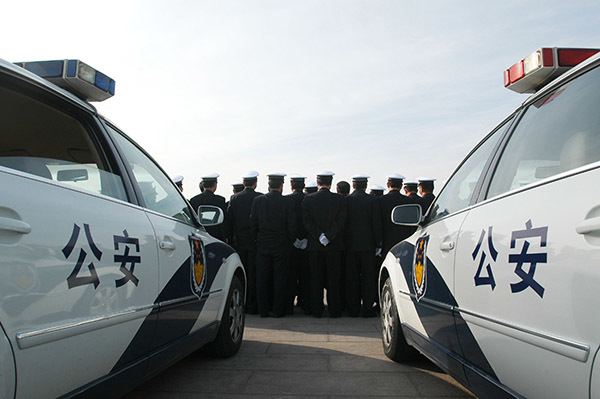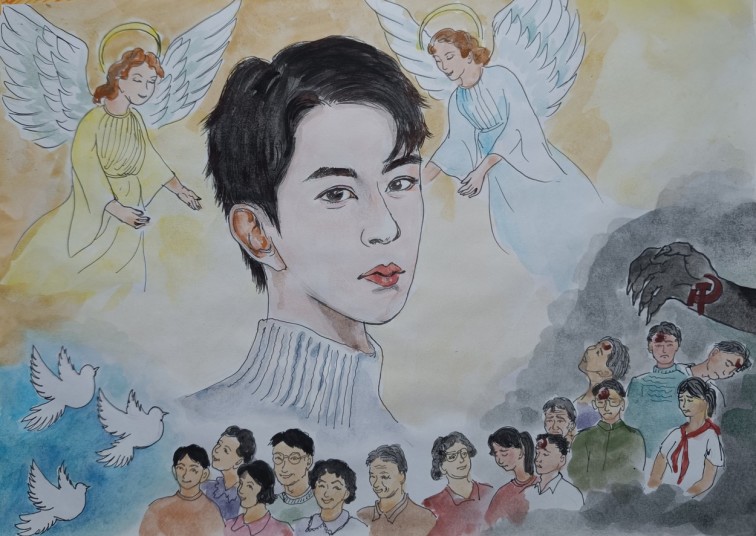Illustration: CCP Police Vehicle (China Photos/Getty Images)
[People News] On November 18, self-media personality Jiang Wangzheng disclosed that Ma Xingrui and his wife Rong Li were taken away for questioning. Jiang noted that Rong Li is a close friend of Peng Liyuan, and that Rong Li's daughter and son-in-law possess Canadian green cards. He mentioned that Ma Xingrui was replaced by Chen Xiaojiang, who was called back to the country by Rong. Jiang Wangzheng further stated that the amount of money involved with Rong Li is estimated to be between 7 and 8 billion, with part of it located in Hong Kong and the rest in Canada. Logical analysis indicates that Rong Li acts as a 'white glove' for Peng Liyuan, suggesting that this money likely belongs to Peng Liyuan's private funds.
Previously, during the significant political upheaval in Shaanxi, Jiang Wangzheng revealed that Yao Lijun admitted to dividing spoils with Xi Yuanping and Fang Hongwei in a '622' ratio. Fang Hongwei confessed to over 4 billion in illicit funds, of which more than 3 billion was given to Xi Yuanping. With Ma Xingrui now facing issues, it raises the question: Who is investigating the Xi family?
1. The Power Elite of the Chinese Communist Party
There is a popular saying among the public regarding the families of high-ranking officials in the Chinese Communist Party:
A cloud in Inner Mongolia, a leaf in the two Guang provinces, two flowers in Shanghai,
After Xu in Nanjing, the Zhe-Min-Gan ethnic group stands, a little apple in Yunnan,
Kanghua in Sichuan, Bo Ling in Shanxi, whose land is in Hubei and Hunan.
The 'cloud in Inner Mongolia' refers to founding general Ulanfu and his Yun family.
The 'leaf in the two Guang provinces' refers to the Ye Jianying family.
The 'two flowers in Shanghai' refer to the Chen Yun and Chen Yi families, which were later replaced by the Jiang family.
'After Xu in Nanjing' refers to the Xu Shiyou family, who was promoted to general in 1955, served as the commander of the Nanjing Military Region, and was a member of the Central Committee, alongside the Liu Bocheng family.
The phrase 'Zhejiang, Fujian, and Jiangxi clans' refers to the prominent political families in these regions. In Zhejiang, the Yu Zhengsheng family (descendants of Huang Jing) is notable, while in Fujian, the Ye family (descendants of Ye Fei) and the Cai Qi family are significant. In Jiangxi, the Zeng Qinghong family (descendants of Zeng Shan) is also influential.
The term 'Yunnan Little Apple' is used by netizens to describe the business-oriented Ham family, known for their extensive connections. However, the real power holders are believed to be General Yang Dezhi, General Zhou Xihan, General Qin Jiwei, and Chen Geng.
The phrase 'Sichuan has Kanghua' refers to the Kanghua company owned by Deng Pufang, indicating that Sichuan is under the influence of the Deng family.
The statement 'In Shanxi and Shaanxi, the original power belonged to Bo Xilai and Ling Jihua; after their removal, it became the fiefdom of Xi Yuanping, a distant relative of the emperor' highlights the shifting power dynamics in these regions.
As for 'Whose land is in Hubei and Hunan?' netizens suggest that Hunan is associated with the founding general Huang Kecheng's family, while Hubei is also linked to the Deng family, allowing the Yu Zhengsheng family to act on their behalf.
Furthermore, netizens have summarized the power dynamics: 'The Deng family controls the world, the Wang family is the party, the Ye family holds power, the Yang family has military leaders, the Jiang family specializes in military science, the Li family dominates energy, the Zhu family is involved in finance, the He family is in military industry, the Chen family manages banking, the Zeng family handles intelligence, the Liao family oversees overseas Chinese affairs, the Rong family is linked to CITIC, the Yun family has interests in Inner Mongolia, the Xu family is based in Suzhou, the Sun family is in Yunnan, and the Ma family is involved in Qinghai, Gansu, and Ningxia.'
These observations suggest that the power structure within the upper echelons of the Chinese Communist Party is not as completely dominated by Xi Jinping's family as is often perceived.
2. Xi Jinping's economic downturn may be a strategy to weaken rival factions.
Over the past decade, Xi Jinping's anti-corruption campaign has appeared to be a significant effort, yet it has not effectively dismantled other major political families. In reality, the only heavyweight figures who have truly fallen are Bo Xilai and Ling Jihua, both of whom were ousted by Hu Jintao and Wen Jiabao prior to the 18th National Congress, and their removal is not directly linked to Xi Jinping's anti-corruption initiatives after he assumed power.
Currently, Xi Jinping is aiming for a fourth term as the 'Communist Emperor', which he can only achieve through a large-scale crackdown on various family factions. However, the challenge lies in the fact that while he is concentrating power and engaging in political struggles, he is causing a significant downturn in the national economy. This downturn directly harms the economic networks that various families depend on for their livelihoods, ultimately leading to a coalition against Xi as their interests are threatened.
Many overseas media outlets attribute the disarray in the Chinese Communist Party's economy to Xi Jinping. However, from the perspective of power dynamics, Xi's series of economic policies may not be entirely a result of 'incompetence'; rather, they could reflect a deliberate intention to 'cleanse interest groups' and weaken the old power structures. By tightening capital, suppressing the real estate sector, limiting local financing platforms, and regulating internet giants, he is effectively undermining the objectives of these feudal lords, thereby clearing the way for a comprehensive restructuring of the power structure.
In other words, behind the facade of a seemingly chaotic economy, Xi Jinping may be pursuing an alternative strategy: trading economic costs for political restructuring.
3. The Subtle Implications in Zheng Yuwen's Article
Recently, a newspaper published an article by Deng Yuwen titled 'What I Know About the He Weidong and Miao Hua Cases'. On the surface, the article suggests that there has never been a power struggle between Xi Jinping and Zhang Youxia, but it actually conveys messages to certain individuals in a discreet manner.
The article reveals a principle regarding military promotions: the military operates under two systems—one is the military commander system (military command system), and the other is the political work system (political work system). There are two vice chairmen of the Military Commission, and the established rule before the 18th National Congress was that one vice chairman comes from the political work system while the other comes from the military commander system. For instance, Xu Caihou was from a political work background, while Guo Boxiong came from a military commander background.
Since Xi Jinping took office, he has deviated from established norms by appointing both vice chairmen from the military leadership system, specifically Fan Changlong and Xu Qiliang during the 18th National Congress, and Xu Qiliang and Zhang Youxia during the 19th National Congress.
In a detailed article, Deng Yuwen describes how He Miao and his associate formed cliques, opposed the party and Xi, and vied for Xi Jinping's favour against Zhang Youxia, aiming to oust Zhang and install He Weidong as the first vice chairman of the Military Commission. This entire incident was orchestrated by Miao Hua, with He Weidong merely following along.' This account raises two significant questions:
First, given that Miao Hua, as a political officer and director of the political department, has reached the peak of his career, why would he collaborate with He Weidong to target Zhang Youxia, a close ally of Xi Jinping?
Second, how could Zhang Shengmin, who also comes from a political background, be promoted to vice chairman of the Military Commission? Did Xi Jinping break his own rules, or was it someone else who did? If it were someone else, that person could only be Zhang Youxia.
Deng Yuwen, born in 1968, previously served as an editor for the 'Study Times' and is currently a visiting scholar at the China Policy Institute at the University of Nottingham. In March 2013, he published an article titled 'China Should Abandon North Korea' in the 'Financial Times,' which resulted in his dismissal from the 'Study Times.'
The themes in his article advocating for 'political reform, intra-party democracy, collective leadership, rule of law and institutionalization, opposition to excessive concentration of power, attention to vulnerable groups and fair distribution, and equalizing wealth and social security' align closely with the policies of the Hu-Wen era, which emphasized 'intra-party democracy, collective leadership, scientific development, and a people-centered approach.'
Thus, Deng Yuwen's decision to intentionally downplay the power struggle between Xi Jinping and Zhang Youxia in his article 'The Inside Story of He Weidong and Miao Hua as I Understand It' likely stems from the assessment that the current situation is still not entirely clear. He cannot openly address this issue, yet he needs to communicate the genuine information regarding the internal conflicts to a specific audience. In this scenario, Deng Yuwen's writing displays a 'dual narrative' feature—while it appears cautious on the surface, it is actually sending signals to certain circles.
(First published in People News)
△









News magazine bootstrap themes!
I like this themes, fast loading and look profesional
Thank you Carlos!
You're welcome!
Please support me with give positive rating!
Yes Sure!